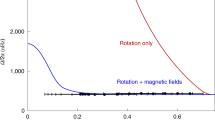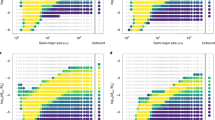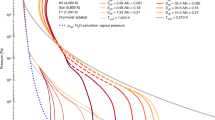Abstract
SIR JOSEPH LARMOR in his letter in NATURE of June 3 concludes that because the temperature of the earth's surface has never changed by 50° C. in excess or defect of its present value since the commencement of organic evolution—as that would have destroyed all organic life—the effective temperature of the solar radiating surface cannot have changed from its present mean value, 6,000° K., by 1,000° in excess or defect.
This is a preview of subscription content, access via your institution
Access options
Subscribe to this journal
Receive 51 print issues and online access
$199.00 per year
only $3.90 per issue
Buy this article
- Purchase on Springer Link
- Instant access to full article PDF
Prices may be subject to local taxes which are calculated during checkout
Similar content being viewed by others
References
"Further Studies in Terrestrial Radiation", Mem. Roy. Met. Soc., 3, No. 21; 1928.
"The Climate during the Pleistocene Period", Proc. Roy. Soc. Edin., 50, 262; 1930.
Author information
Authors and Affiliations
Rights and permissions
About this article
Cite this article
SIMPSON, G. The Astronomical Radiative Stability. Nature 131, 875–876 (1933). https://doi.org/10.1038/131875a0
Issue Date:
DOI: https://doi.org/10.1038/131875a0
This article is cited by
-
Solar Radiation and Planetary Atmospheres
Nature (1933)
Comments
By submitting a comment you agree to abide by our Terms and Community Guidelines. If you find something abusive or that does not comply with our terms or guidelines please flag it as inappropriate.



